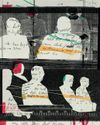
Truman Capote couldn't have fully appreciated his good fortune while writing the true-crime masterpiece "In Cold Blood." By the time his so-called nonfiction novel was published with its many creative licenses-the two killers whose lives he'd dramatized had been executed; they couldn't talk back. He wasn't so lucky with his next major project, "Answered Prayers," which he claimed would be his magnum opus. In one of its chapters, published in Esquire under the title "La Côte Basque, 1965," he exposed close-held secrets of the friends and muses he called his swans: a set of graying socialites who'd achieved fashion-plate fame. They quickly closed ranks-and, in the decade between the excerpt's release and his death, in 1984, Capote failed to complete "Answered Prayers," or any other book-length manuscript.
His exile from Manhattan high society, and his accompanying artistic decline, is the subject of the new season of the Ryan Murphy anthology drama "Feud,"subtitled "Capote vs. the Swans." Capote's 1948 début novel, "Other Voices, Other Rooms," with its queer characters and famously naughty author photo, introduced him as a convention-flouting wunderkind. Those days of youthful defiance are long gone by the time "Capote vs. the Swans" opens, in the late sixties, with Capote (Tom Hollander) suggesting to his closest confidante, Babe Paley (Naomi Watts), that there's no higher happiness than material comfort. After discovering that her husband, Bill, is engaged in his umpteenth affair, Babe is contemplating divorce, but Capote discourages it, citing her age and Bill's stature as the chairman of CBS. "You have a great life," he reminds her. "You have a house in Bermuda, a mansion in Coral Gables, the thing in London.
この記事は The New Yorker の February 12 -19, 2024 (Double Issue) 版に掲載されています。
7 日間の Magzter GOLD 無料トライアルを開始して、何千もの厳選されたプレミアム ストーリー、9,000 以上の雑誌や新聞にアクセスしてください。
すでに購読者です ? サインイン
この記事は The New Yorker の February 12 -19, 2024 (Double Issue) 版に掲載されています。
7 日間の Magzter GOLD 無料トライアルを開始して、何千もの厳選されたプレミアム ストーリー、9,000 以上の雑誌や新聞にアクセスしてください。
すでに購読者です? サインイン

GET IT TOGETHER
In the beginning was the mob, and the mob was bad. In Gibbon’s 1776 “Decline and Fall of the Roman Empire,” the Roman mob makes regular appearances, usually at the instigation of a demagogue, loudly demanding to be placated with free food and entertainment (“bread and circuses”), and, though they don’t get to rule, they sometimes get to choose who will.

GAINING CONTROL
The frenemies who fought to bring contraception to this country.

REBELS WITH A CAUSE
In the new FX/Hulu series “Say Nothing,” life as an armed revolutionary during the Troubles has—at least at first—an air of glamour.

AGAINST THE CURRENT
\"Give Me Carmelita Tropicana!,\" at Soho Rep, and \"Gatz,\" at the Public.

METAMORPHOSIS
The director Marielle Heller explores the feral side of child rearing.

THE BIG SPIN
A district attorney's office investigates how its prosecutors picked death-penalty juries.

THIS ELECTION JUST PROVES WHAT I ALREADY BELIEVED
I hate to say I told you so, but here we are. Kamala Harris’s loss will go down in history as a catastrophe that could have easily been avoided if more people had thought whatever I happen to think.

HOLD YOUR TONGUE
Can the world's most populous country protect its languages?

A LONG WAY HOME
Ordinarily, I hate staying at someone's house, but when Hugh and I visited his friend Mary in Maine we had no other choice.

YULE RULES
“Christmas Eve in Miller’s Point.”